School Reference Letter
[Your Name]
[Your Title/Position]
[School/Organization Name]
[School Address]
[City, State, ZIP]
[Email Address]
[Phone Number]
[Date]
[Recipient's Name]
[Recipient's Title/Position]
[Recipient's School/Organization Name]
[Recipient's Address]
[City, State, ZIP]
Dear [Recipient's Name],
I am writing this letter to highly recommend [Student's Name] for [purpose of the reference letter, e.g., scholarship, college admission, job application, etc.]. I have had the pleasure of knowing and working closely with [Student's Name] at [Your School/Organization Name] for the past [duration of your association].
Throughout my time with [Student's Name], I have been consistently impressed by their academic performance, dedication, and involvement in extracurricular activities. [He/She] is an exceptional individual who possesses a unique combination of intelligence, creativity, and leadership skills. [Student's Name] has consistently demonstrated a strong work ethic and a genuine passion for learning.
In the classroom, [Student's Name] is an active and engaged participant who consistently goes above and beyond to grasp complex concepts and contribute meaningfully to class discussions. [He/She] is not only receptive to feedback but also proactive in seeking additional challenges to expand [his/her] knowledge. [His/Her] commitment to excellence is evident in [his/her] consistently high grades and academic achievements.
Beyond academics, [Student's Name] is an active participant in various extracurricular activities. [He/She] has been an instrumental member of [mention clubs/teams/organizations] and has demonstrated outstanding leadership qualities in these roles. [His/Her] ability to collaborate effectively with peers and take on responsibilities speaks volumes about [his/her] character and interpersonal skills.
As [Student's Name]'s [teacher/counselor/mentor], I have had numerous opportunities to witness [his/her] growth and development over the years. [He/She] is not only a dependable and responsible individual but also someone who is compassionate, empathetic, and always willing to lend a helping hand to others.
Based on [Student's Name]'s exceptional qualities and achievements, I have no doubt that [he/she] will excel in any endeavor [he/she] chooses to pursue. [He/She] has my highest recommendation, and I am confident that [he/she] will be a valuable asset to [Recipient's School/Organization Name].
If you have any further questions or require additional information about [Student's Name], please do not hesitate to contact me. I would be more than happy to provide any necessary details.
Thank you for considering [Student's Name] for [purpose of the reference letter]. I believe [he/she] will contribute significantly to your esteemed institution/organization.
Sincerely,
[Your Name]
[Your Title/Position]
[School/Organization Name]
[Email Address]
[Phone Number]
Academic Reference Letter for College Admission
Dear Admissions Committee,
I am writing to highly recommend [Student Name] for admission to your esteemed institution. I have had the pleasure of teaching [Student Name] in [Subject/Grade] for the past [X] years and have consistently observed their dedication, intelligence, and positive attitude.
[Student Name] demonstrates excellent academic performance, critical thinking skills, and a genuine curiosity for learning. Beyond academics, they exhibit strong leadership abilities, participate actively in extracurricular activities, and display kindness and respect toward peers and staff.
I am confident that [Student Name] will be a valuable addition to your institution and continue to excel academically and personally. Please feel free to contact me if further information is required.
Sincerely,
[Teacher Name]
[Position/School]
Reference Letter for Scholarship Application
To Whom It May Concern,
I am pleased to recommend [Student Name] for the [Scholarship Name]. As [Student Name]'s [Teacher/Counselor] at [School Name], I have witnessed their exceptional academic achievements and strong commitment to community service.
[Student Name] consistently demonstrates responsibility, initiative, and perseverance in all their endeavors. Their passion for [Field or Interest] and commitment to excellence make them a strong candidate for this scholarship.
I wholeheartedly support their application and believe they will make a meaningful contribution to your program.
Best regards,
[Teacher Name]
[Position/School]
Reference Letter for Transfer to Another School
Dear [Recipient Name],
This letter serves as a reference for [Student Name], who has been a student at [School Name] since [Start Date]. During their time here, [Student Name] has shown consistent academic growth, discipline, and respectful behavior toward peers and staff.
They have been actively involved in [Clubs, Sports, or Activities] and have shown great adaptability and enthusiasm for learning. I believe [Student Name] will be an asset to your school community and will continue to excel in their academic pursuits.
Please contact me if additional information is needed.
Sincerely,
[Teacher Name]
[Position/School]
Character Reference Letter for Student
To Whom It May Concern,
I am writing to attest to the good character of [Student Name]. As [Student Name]'s teacher at [School Name], I have had the opportunity to observe their integrity, responsibility, and respectfulness over the past [X] years.
[Student Name] is honest, reliable, and compassionate. Their positive attitude and willingness to help others make them an exemplary member of our school community.
I confidently recommend [Student Name] for any program, position, or opportunity they seek.
Sincerely,
[Teacher Name]
[Position/School]
Reference Letter for Summer Program Participation
Dear [Program Coordinator],
I am delighted to recommend [Student Name] for participation in your summer program. As [Student Name]'s [Teacher/Counselor] at [School Name], I have observed their enthusiasm for learning, creativity, and collaborative spirit.
[Student Name] is an engaged and motivated student who actively contributes to classroom discussions and group projects. I am confident that they will thrive in your program and contribute positively to the experience.
Warm regards,
[Teacher Name]
[Position/School]
Simple Quick Reference Letter
To Whom It May Concern,
I am writing to recommend [Student Name]. They have been a student at [School Name] for [X] years and have consistently shown dedication, responsibility, and a positive attitude.
I believe they will succeed in any academic or extracurricular endeavor.
Sincerely,
[Teacher Name]
[Position/School]
What is a School Reference Letter and Why You Need It
- A school reference letter is a formal document providing information about a student’s academic performance, character, and suitability for a program, school, or opportunity.
- Purpose: To assist in admissions, scholarships, transfers, or extracurricular program applications.
- Helps institutions or organizations make informed decisions about a student’s qualifications and potential.
- Can highlight both academic strengths and personal qualities.
Who Should Write a School Reference Letter
- Teachers, instructors, or subject mentors familiar with the student’s academic performance.
- School counselors or academic advisors who know the student’s personal and social development.
- Principals or headmasters for formal or official references.
- Coaches or extracurricular leaders if the recommendation focuses on non-academic skills.
Whom the Letter Should Be Addressed To
- Admissions officers for school, college, or university applications.
- Scholarship committees for financial or merit-based awards.
- Program coordinators for summer camps, internships, or extracurricular programs.
- New schools or educational institutions during transfer applications.
- Organizations requesting character references or verification.
When to Write a School Reference Letter
- During application periods for schools, colleges, or programs.
- When a student applies for a scholarship or financial aid.
- Before a student transfers to another institution.
- Prior to participation in extracurricular programs, summer camps, or competitions.
- Whenever a character reference is required for formal or informal purposes.
How to Write and Send a School Reference Letter
- Collect relevant information about the student: grades, achievements, awards, and extracurricular activities.
- Decide the tone: formal, professional, or casual depending on purpose.
- Include an introduction stating the purpose and relationship to the student.
- Describe academic performance, character, and skills with specific examples.
- Conclude with a clear recommendation and contact information.
- Send via email, physical letter, or online application as requested by the institution.
Requirements and Prerequisites Before Writing
- Verify the purpose of the reference and the recipient.
- Gather accurate academic records or student achievements.
- Ensure you know the student well enough to write a meaningful and truthful reference.
- Confirm deadlines and submission format requirements.
- Obtain permission from the student or parent if required.
Formatting Guidelines for School Reference Letters
- Length: Typically 1–2 pages depending on depth of content.
- Tone: Professional and respectful; avoid exaggeration.
- Structure: Introduction, main body with details, and conclusion.
- Wording: Clear, concise, and specific; avoid vague statements.
- Attachments: Include academic transcripts or certificates if relevant.
- Mode: Email, printed letter, or online submission per recipient requirements.
After Sending the Reference Letter: Follow-Up
- Confirm receipt with the recipient if necessary.
- Be available for additional inquiries or verification calls.
- Keep a copy for records and future reference.
- Notify the student that the letter has been submitted.
Pros and Cons of Writing a School Reference Letter
Pros:
- Supports student applications and opportunities.
- Highlights student strengths and achievements.
- Establishes a professional relationship between educator and institution.
- Enhances credibility of the student’s profile.
Cons:
- Time-consuming to write thoroughly and thoughtfully.
- Responsibility to ensure accuracy and honesty.
- Risk of misunderstanding if tone or content is misinterpreted.
Tricks and Tips for Effective School Reference Letters
- Use specific examples to illustrate strengths and achievements.
- Personalize the letter for the student and intended recipient.
- Keep the language positive and professional.
- Double-check spelling, grammar, and formatting.
- Use active voice and concise sentences for clarity.
Common Mistakes to Avoid
- Writing generic or vague statements.
- Omitting critical achievements or character traits.
- Using exaggerated or untruthful information.
- Ignoring recipient guidelines or submission requirements.
- Sending the letter late or without verification of receipt.
Elements and Structure of a School Reference Letter
- Opening: Greeting and purpose of the letter.
- Introduction: Relationship to the student and duration of acquaintance.
- Academic Performance: Grades, achievements, and learning attitude.
- Personal Attributes: Character, responsibility, teamwork, and leadership.
- Extracurricular Activities: Participation and contributions.
- Conclusion: Clear recommendation and contact information.
- Optional Attachments: Certificates, transcripts, or portfolios.
Does a School Reference Letter Require Authorization?
- Typically does not require formal attestation unless requested by institutions.
- In some cases, a school principal or counselor’s approval may be needed for official submissions.
- Ensures authenticity and maintains professional standards.

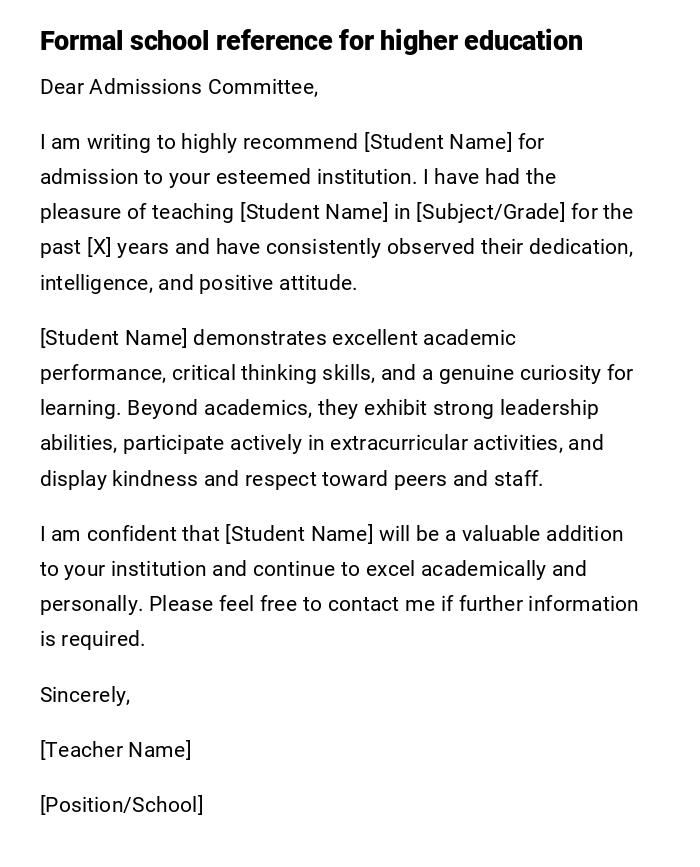
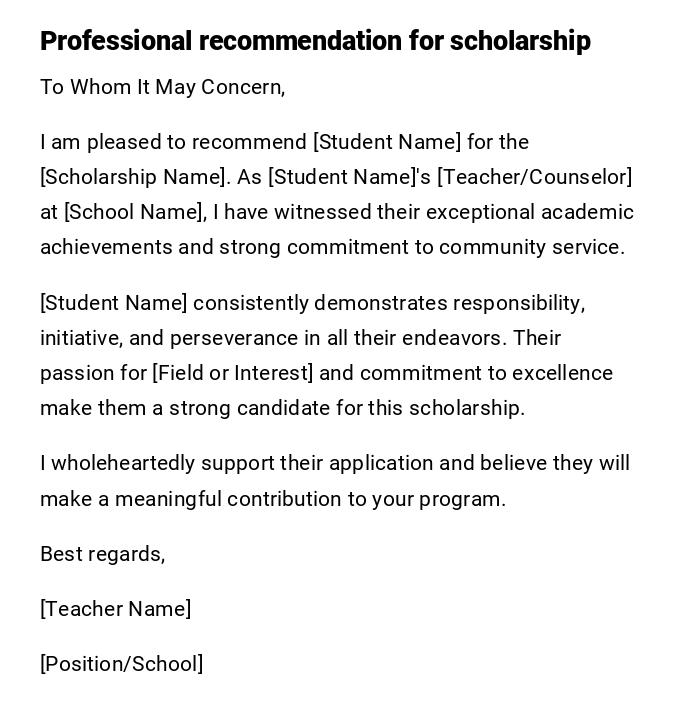
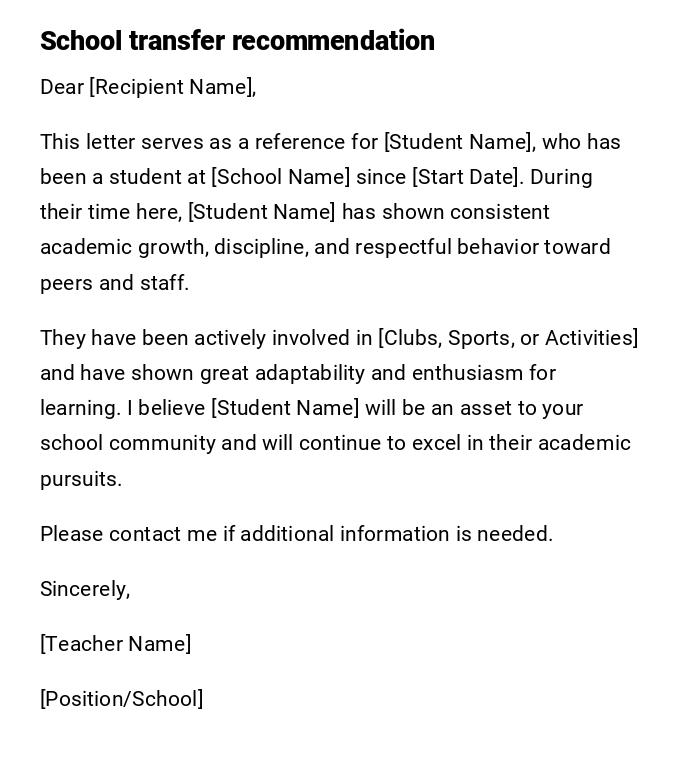
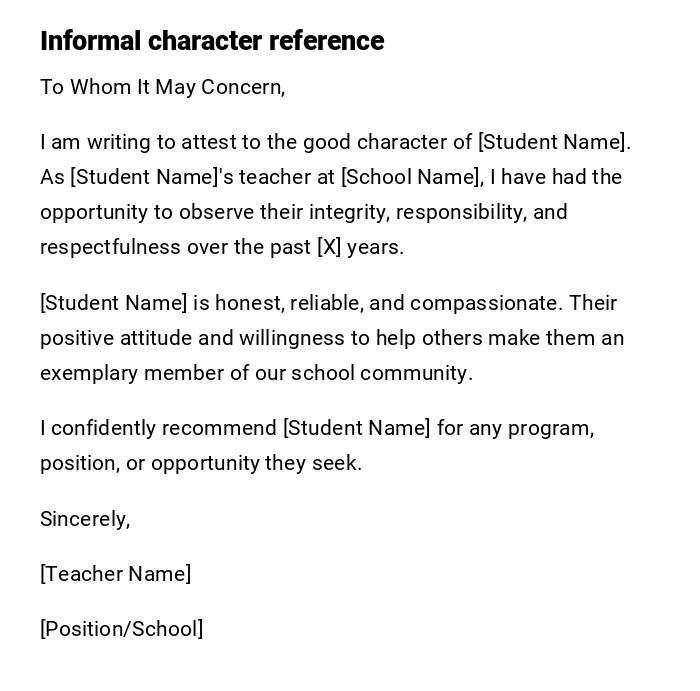
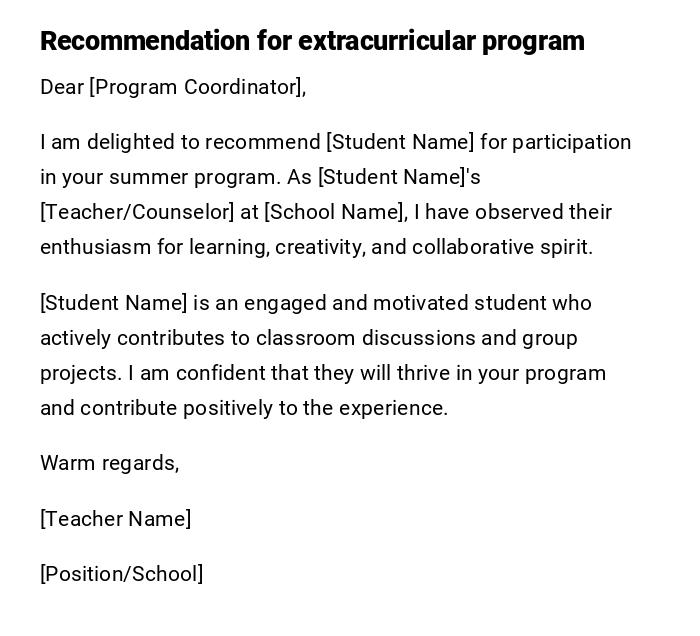
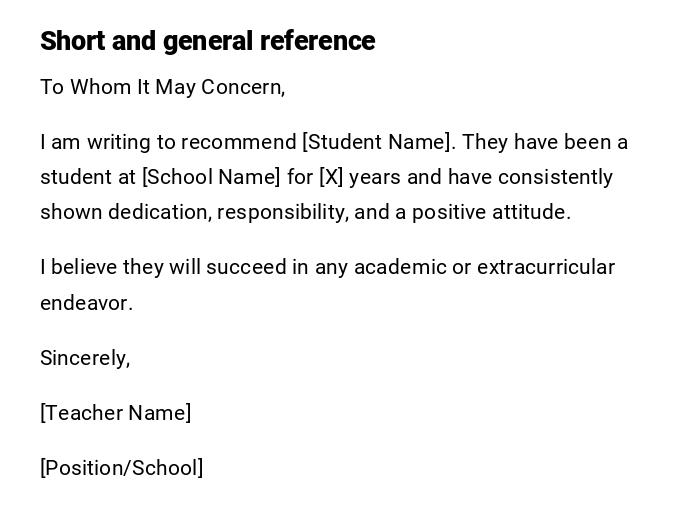

 Download Word Doc
Download Word Doc
 Download PDF
Download PDF